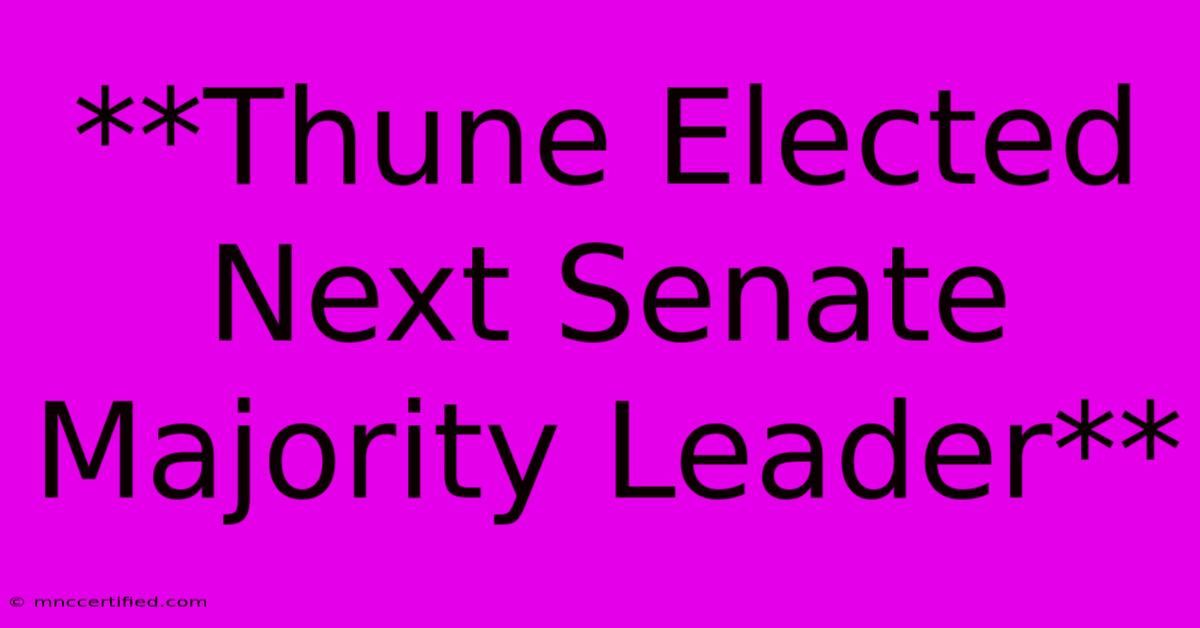**Thune Elected Next Senate Majority Leader**

Table of Contents
Thune Elected Next Senate Majority Leader: What This Means for the Future of the Republican Party
On May 17, 2023, Senator John Thune (R-SD) was elected as the next Senate Majority Leader, replacing Senator Mitch McConnell (R-KY) who had held the position for over a decade. Thune's election marks a significant shift in the Republican Party's leadership, with implications for both the upcoming election cycle and the party's future direction.
A New Generation Takes the Reins
Thune's victory represents a generational shift in the Republican Party, with a younger, more moderate leader stepping into the spotlight. At 62 years old, Thune is significantly younger than McConnell, who is 82. This change in leadership could signal a move towards a more pragmatic approach, focusing on building consensus and appealing to a wider range of voters.
Thune's Background and Priorities:
- Known for his pragmatism: Thune has a reputation for being willing to work across the aisle and find common ground, even on contentious issues.
- Focus on economic issues: Thune is expected to prioritize economic growth and job creation, issues that resonate with voters across the political spectrum.
- Commitment to traditional Republican values: Despite his moderate approach, Thune remains committed to core Republican principles like limited government and fiscal responsibility.
Implications for the 2024 Elections
Thune's leadership could significantly influence the 2024 election cycle. His focus on economic issues and bipartisan cooperation could appeal to moderate voters and potentially swing the balance in favor of the Republican Party. However, his moderate approach might alienate some of the party's more conservative base, potentially leading to internal divisions.
Key Areas of Focus for Thune:
- Campaign finance reform: Thune is expected to push for campaign finance reform, an issue that has gained bipartisan support in recent years.
- Infrastructure spending: Thune is likely to champion infrastructure investments, a crucial area where there is potential for bipartisan agreement.
- Addressing the national debt: Thune has consistently advocated for fiscal responsibility, a key issue that could impact the upcoming election.
The Future of the Republican Party
Thune's election is just the first step in what promises to be a period of significant transition for the Republican Party. His leadership will shape the party's direction in the coming years, influencing its policies, electoral strategies, and overall direction.
Challenges for Thune:
- Unifying the party: Thune will face the challenge of uniting a diverse Republican Party that includes both conservative and moderate factions.
- Navigating a divided Congress: Thune will need to find ways to work with Democrats in a highly partisan political environment.
- Maintaining support for the party's agenda: Thune will need to effectively communicate the Republican Party's agenda and priorities to voters.
Conclusion
The election of John Thune as Senate Majority Leader marks a significant turning point for the Republican Party. With his moderate approach and focus on economic issues, Thune could potentially reshape the party's image and appeal to a wider range of voters. However, he also faces significant challenges in uniting a divided party and navigating a complex political landscape. Only time will tell how Thune's leadership will shape the Republican Party's future.
Keywords: John Thune, Senate Majority Leader, Republican Party, Mitch McConnell, 2024 election, political transition, pragmatism, economic issues, bipartisan cooperation, campaign finance reform, infrastructure spending, national debt, party unity, challenges.

Thank you for visiting our website wich cover about **Thune Elected Next Senate Majority Leader**. We hope the information provided has been useful to you. Feel free to contact us if you have any questions or need further assistance. See you next time and dont miss to bookmark.
Featured Posts
-
Mc Cain Leads But Sixers Fall Short
Nov 14, 2024
-
Goldbergs Italian And Travel Finds
Nov 14, 2024
-
Paddy Mc Guinness Tears Up At Children In Need
Nov 14, 2024
-
House Inspectors For Insurance Rebuttal Arkansas
Nov 14, 2024
-
Napoli Property Investments Limited
Nov 14, 2024